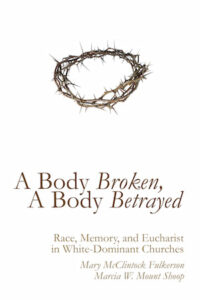 Addressing the wounds of race and privilege that continue to diminish the life of the church
Addressing the wounds of race and privilege that continue to diminish the life of the church
In their new book, A Body Broken, A Body Betrayed: Race, Memory, and Eucharist in White-Dominant Churches, theologians and Presbyterian ministers Mary McClintock Fulkerson and Marcia Mount Shoop emphasize the need to surface the dynamics of whiteness especially in contexts where whites have had the most power in America, such as mainline Protestant churches. Using Eucharist as a template for both the church’s blindness and for Christ’s redemptive capacity, this book invites faith communities, especially white-dominant churches, into new ways of remembering what it means to be the body of Christ.
In his review of A Body Broken, A Body Betrayed, PLT Contributor Kristopher Norris writes:
For McClintock Fulkerson and Mount Shoop, the Eucharist often becomes a practice disconnected from the everyday realities of the lives of practitioners, and in this abstract and ritualized form could actually foster racial solidarity among whites. Instead of opening congregations up to the ‘other,’ the Eucharist often “creates sacrament out of sameness” and insulates churches from the unacknowledged wounds of our colorblind memories. It runs the risk of functioning as an appreciate remembrance of a past act rather than a transformative practice with consequences for how we live in the present.
The authors propose viewing the Eucharist with a “flexible memory” that listens to dissonant stories. This requires the telling of contemporary stories of brokenness and betrayal as part of the liturgy, which may open us up to new ways of seeing our own past and present. In this way the church community can cultivate the skills to notice and name habits and systems that often go unacknowledged and inflict racialized harm. Eucharist, practiced in this way, can disrupt our own self-protective assumptions and attend to God’s presence with those who suffer in the world. It may even change the way we read our own history and understand the abuses we have perpetuated while calling ourselves the Body of Christ.
For more information on McClintock Fulkerson and Mount Shoop’s book, click here. To read Norris’s full review, click here.
